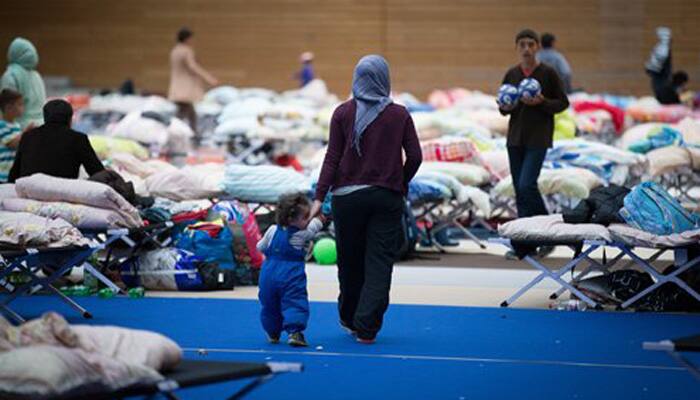Berlin: German authorities warned Sunday they were stretched to capacity to welcome refugees arriving en masse, as Europe scrambled to hold emergency talks on the unprecedented crisis.
Some 13,015 refugees arrived in Munich on Saturday alone, and at least 1,400 are expected Sunday to reach the southern German city -- the end of their exhausting and often perilous journey through Hungary and Austria.
Germany has become the destination of choice for many refugees, particularly for Syrians after Chancellor Angela Merkel decided to relax asylum rules for citizens of the war-torn country.
However, with some 450,000 people arriving in Europe`s biggest economy so far this year, local authorities are buckling under the sudden surge.
"Given the numbers from yesterday, it is very clear that we have reached the upper limit of our capacity," said a Munich police spokesman.
Federal transport minister Alexander Dobrindt also weighed in, saying "effective measures are necessary now to stop the influx".
"That includes help for countries from where refugees are fleeing and also includes an effective control of our own borders which also no longer works given the EU`s complete failure to protect its external borders," he said in a statement.
Dobrindt was essentially referring to the border between Turkey and Greece, where many migrants have crossed.
Merkel herself had called Saturday on Athens, while facing its own deep economic crisis, to make more effort to protect the EU`s external borders.
European Union home affairs ministers will hold emergency talks on Monday as "the situation of migration phenomena outside and inside the European Union has recently taken unprecedented proportions", the Luxembourg presidency.
The Organisation of Islamic Cooperation is also due to hold an emergency meeting on the crisis on Sunday.
While Jordan, Lebanon and Turkey are housing millions of refugees from Syria, many wealthy Gulf states are facing increasing scrutiny over their apparent reluctance to take in people fleeing the conflict.In Munich, order had largely returned to the city`s main railway station on Sunday even though the federal interior ministry said 13,015 people had arrived over the past day.
But Germany`s local authorities say they are at the end of their tether.
The president of the Upper Bavaria region, Christoph Hillenbrand, said he did not know "how we can cope", according to the Bild am Sonntag tabloid which headline its article "Munich on the brink of collapse".
Bavarian public television BR said the city "came very close to a humanitarian disaster", although the authorities finally managed to limit the numbers of people sleeping on mattresses on the floor to just a few dozens, rather than the hundreds as earlier feared.
In a sign that authorities were running out of options, regular passenger trains will be cleared out to transport refugees whereas until now, special services had been used for this purpose.
The aim is to rapidly send refugees onwards to other German cities to free up space for new arrivals.
The authorities are also mulling over whether to open up the Olympiahalle -- a stadium used for the 1972 Olympics and which today serves as a concert hall or sports arena -- as a temporary shelter for the refugees.As the continent scrambles to respond to the biggest movement of people since World War II, sharp divisions have emerged among the European Union`s 28 member states -- both among governments and on the ground.
While Germany and France back proposals to help "frontline" states Italy, Greece and Hungary buckling under the strain, European Commission proposals for sharing 160,000 new arrivals in a quota scheme are facing resistance from eastern members.
Hungary, which reported a new record in migrant arrivals -- 4,330 on Saturday -- was working around the clock to finish a controversial anti-migrant fence along its border with Serbia.
Budapest has recorded some 180,000 people entering illegally this year and has passed a raft of tough new laws that will take effect on Tuesday, meaning anyone crossing the border illegally can be deported or even jailed.
"These migrants are not coming our way from war zones but from camps in Syria`s neighbours... So these people are not fleeing danger and don`t need to be scared for their lives," hardline Hungarian Prime Minister Viktor Orban told Germany`s Bild daily.
He said Merkel`s decision to relax asylum laws had caused "chaos" and accused European leaders of "living in a dream world".
The idea that quotas would work is an "illusion," he said. "The influx is endless: from Pakistan, Bangladesh, Mali, Ethiopia, Nigeria. If they are all going to come here, then Europe is going to go under."
Austria`s chancellor however compared Orban`s treatment of migrants to Nazi-era cruelty.
"Piling refugees on trains in the hopes that they go far far away brings back memories of the darkest period of our continent," Werner Faymann told German weekly Der Spiegel.
Divisions were also seen on the ground, with tens of thousands marching through London on Saturday waving placards saying "Refugee lives matter", while in eastern European capitals, protesters called for refugees to "go home".
The International Organization for Migration said Friday that more than 430,000 people have crossed the Mediterranean to Europe this year, with 2,748 dying en route or going missing.
















